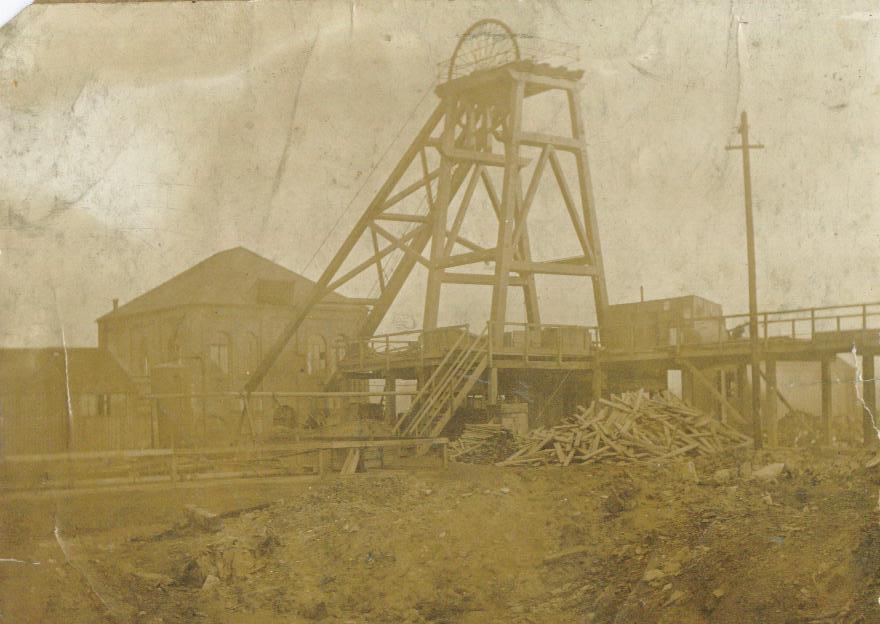Wigan Album
Pemberton
9 Comments
Photo: John Bolton
Item #: 12323
My Grandfather, George Bolton, was a colliery carpenter and shaftsman who worked on it's construction.
Work started on it in 1910.
In 1913 when coal extraction was about to begin, water poured into the pit bottom where thirteen men were working. One of these was my grandad, who held the manager afloat, as he could not swim, until they were rescued.
The pit was used afterwards for the removal of water.
I don't know when this photo was taken.
A Great historical photo. I can't remember ever seeing any other photos of this pit.
Hi Ron,
There is another picture of this same pit, taken in the thirties, with the staging and steps dismantled, in 'Founded on Coal' which we've just been looking at online.
The structure of the headgear and building to the left are the same, and the story about the flooding ties up with the story handed down to us.
I thought the Venture pit was located somewhere near the pub of the same name - ie near Kinlet Rd etc Highfield . . .
Am I mistaken?
Your right Ian, Kinlet road was just about the position of the pit. we used to play around the few buildings that hadn't been demolished.
Part of it was used in the fifties for screening coal from Somersale pit. There was also a couple of Cottages that I think belonged to the pit. a family called Winstanley lived in one of the cottages.
Just to clarify the location of this pit -
p.18 of 'Founded on Coal' by Ray and Derek Winstanley (Google it and you can read it online)
"....Venture Pits, which were near the present telephone box at the end of Merton Road". They were from the 1800s.
So that IS the correct location for the VENTURE Pits.
The NEW Venture Pit was started much later, in 1910 and you can read the story about it p.24 - 27, how it flooded and concluding
"The capped-off shaft of the New Venture Pit can be seen near the Triangle Valve Works on the Lamberhead Green Industrial Estate."
It is also mentioned in Donald Anderson's 'The Orrell Coalfield'.
Hope that clears it up!
Ah! my mistake Cathy many thanks! I have "Founded on Coal" and DA's "The Orrell Colafield" - I should have known better!!! :)
Good photo!
The New Pit was also known as Blundell's New Venture Pit or Coronation Pit. They started sinking it in 1910, down to the Mountain Mine coal seams. Jack Foster, who lived on Rose Hill, was the chargehand sinker on one of the 2 shafts. Jack Ashcroft and Tom Brooks were winders.
Most of the material for the New Pit came from the main Blundell's Colliery down Foundry Lane and had to be brought up Enfield Street and Smethurst Lane by a steam wagon (driver Jack Fairhurst)as the railway company would not allow loads over 2 tons to cross the Heyes Bridge.
There were also 2 early pits about 150 yards east of the Heyes Bridge - the Strawberry and Raspberry Pits, or the Upper Venture Pits) - which get little mention. They were part of Blundell's Collieries and apparently connected by a railroad from there down through the Venture Pits (Bottom Venture Pits),connecting with a railroad line from the Mill Pit (150 yards up the Old Line from Pony Dick in the Summersales) in the field behind Ackers' farm and then going on to the Bye Pit and Engine Pit (near the Prince, Queen and King Pits - sunk later) at Pemberton Collieries. From there the railroad went down Victoria Street to the canal at Seven Stars Bridge.
I don't know if they are still there, but there used to be some smallish spoil heaps just to the north of the railway line, about 150 yards to the east of the Heyes Bridge. The 2 pits may already have finished when the main line railway was constructed through that site in the late 1840s.
The near disaster happened in 1910. I have my 3x Grt Grandad father's hand written account. He was Thomas Brookes. The Winder.
The Venture pub occupies and is built on the site of an old reservoir.